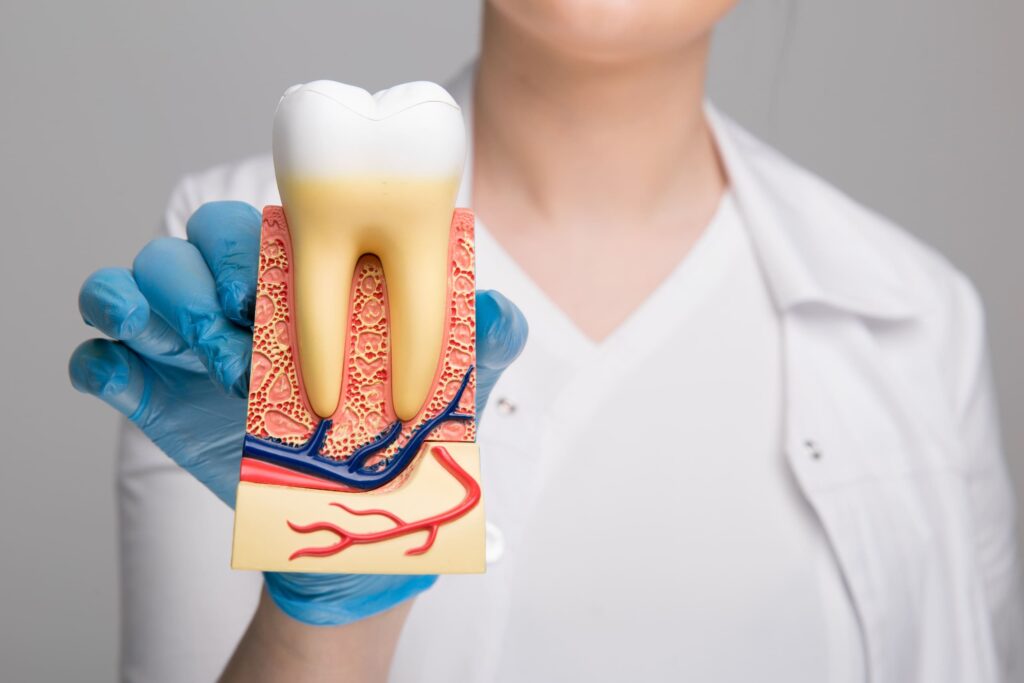
Signs You May Need a Root Canal Treatment
Looking for solutions to address tooth pain or damage? If so, Dr. Shtilman and her team at Omnia Dental may recommend root canal therapy. The endodontic treatment can relieve your discomfort and save the affected tooth, restoring its form and function. Let’s take a look at signs you may need a root canal treatment.
Why Would You Need a Root Canal Treatment?
Inside every tooth is the pulp chamber, which contains nerves, blood vessels, and connective tissue. Deep decay, a tooth chip, trauma, or damaged dental work can provide a pathway for harmful bacteria to enter the tooth pulp, leading to inflammation or infection.
Tooth pulp damage usually requires root canal therapy, which involves removing the diseased pulp, cleaning and shaping the root canals, sealing the space, and placing a dental crown for protection. The endodontic procedure is the only option to preserve a damaged tooth.
Left untreated, tooth pulp damage can lead to complications, including severe pain, an abscess, bone loss around the tooth roots, and even tooth loss. Moreover, the infection can affect the neighboring teeth and can enter the bloodstream, putting your health at risk. The only alternative to root canal therapy is having the infected tooth extracted and replaced by a dental bridge or implant.
What Are Warning Signs That You May Need a Root Canal Treatment?
Here is a look at some of the most common warning signs of tooth pulp damage requiring root canal therapy:
- A Persistent Toothache: Sharp or throbbing pain that lingers is often a sign of tooth pulp damage. Even if the pain relief medication helps, the pain will eventually return.
- Pain When Biting or Chewing: Biting, chewing, or placing pressure on a tooth is usually a sign of an underlying problem. The discomfort usually occurs due to tooth inflammation or infection that can irritate the surrounding nerves.
- A Chipped or Cracked Tooth: Biting into hard candy or suffering a blow to the face in a softball game can lead to a chipped or cracked tooth. This can provide an entryway for harmful bacteria, resulting in tooth pulp inflammation or infection.
- Sensitivity to Hot and Cold: Tooth pulp infection can lead to sensitivity and discomfort in response to hot or cold temperatures. The sensitivity usually lingers long after the sources of heat or cold have been removed.
- Gum Swelling and Tenderness: Inflammation or infection in the root can cause the gum tissues to become red, swollen, and tender. You may also develop a pimple-like bump on the gum near the infected tooth, indicating an abscess.
- Tooth Darkening: A tooth that has turned dark or gray in color may indicate that the nerve and blood vessels within the tooth have sustained damage. Tooth darkening typically results from trauma or infection.
- Persistent Bad Breath: Bad breath or an unpleasant taste in your mouth that brushing and flossing can’t resolve may indicate tooth pulp damage. That’s especially true if you have other symptoms of infection.
Root Canal Therapy Near Me in Buffalo Grove, IL
If you have warning signs of tooth pulp damage that may require root canal therapy, contact Omnia Dental to schedule a consultation. Dr. Shtilman will recommend the most conservative solution to restore your smile. We invite you to call 847-495-2292 to schedule your appointment or request one online today!
